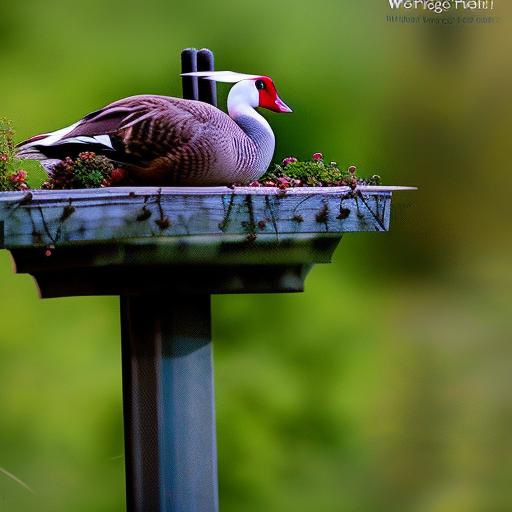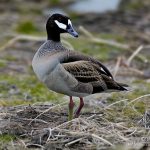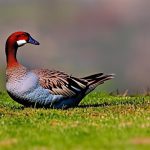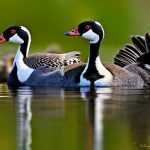Geese invading gardens can be a frustrating problem for many homeowners. These large birds can cause damage to plants, leave behind droppings, and create a mess in the garden. However, it is important to find humane solutions to deter geese rather than resorting to harmful methods. This article will explore various methods for deterring geese from gardens while prioritizing the well-being of these animals.
Key Takeaways
- Geese are attracted to gardens because they offer a source of food, water, and shelter.
- Physical barriers such as fences, netting, and hedges can be effective in keeping geese out of your garden.
- Decoys such as fake predators or other animals can deter geese from entering your garden.
- Noise and light deterrents such as alarms, strobe lights, and reflective tape can also be effective in keeping geese away.
- Planting vegetation that geese dislike such as prickly or thorny plants can discourage them from entering your garden.
Understanding why geese are attracted to gardens
Geese are attracted to gardens for several reasons. One of the main factors is food availability. Gardens often provide a rich source of vegetation that geese find appealing. Additionally, gardens can offer shelter and protection from predators. Understanding these factors is crucial in finding effective solutions to deter geese.
To address the issue of food availability, homeowners can take steps to minimize the attractiveness of their gardens to geese. This can include removing any fallen fruits or vegetables, covering plants with netting or cages, and using repellents that make the vegetation less appealing to geese.
Creating physical barriers to keep geese out
One effective method for deterring geese from gardens is by creating physical barriers. Fences and netting can be used to prevent geese from accessing the garden area. Fences should be at least three feet high and have small openings to prevent geese from squeezing through. Netting can be placed over plants or entire garden areas to keep geese from reaching the vegetation.
When installing physical barriers, it is important to ensure they are properly secured and maintained. Geese are persistent creatures and can find ways around or through poorly installed barriers. Regularly inspecting and repairing any damage to fences or netting will help maintain their effectiveness.
Using decoys to deter geese from entering your garden
Decoys can be an effective method for scaring geese away from gardens. These decoys mimic natural predators and create a sense of danger for the geese. Common decoys include fake owls, coyotes, or even alligators.
To maximize the effectiveness of decoys, it is important to regularly move them around the garden. Geese can become accustomed to stationary decoys and may eventually ignore them. Moving the decoys every few days will help maintain their deterrent effect.
Implementing noise and light deterrents
Noise and light deterrents can also be effective in deterring geese from gardens. Alarms or noisemakers that emit loud sounds can startle geese and make them uncomfortable. Strobe lights or other bright lights can also be used to create a sense of danger and discourage geese from entering the garden.
When using noise and light deterrents, it is important to vary the timing and location of their use. Geese can become accustomed to consistent patterns and may eventually ignore the deterrents. Randomizing the timing and location of noise and light deterrents will help maintain their effectiveness.
Planting vegetation that geese dislike

Another method for deterring geese from gardens is by planting vegetation that they dislike. Geese tend to avoid plants with prickly or bitter leaves. Incorporating these types of plants into the garden can make it less appealing to geese.
Examples of plants that geese dislike include holly bushes, juniper shrubs, and yarrow flowers. These plants have prickly leaves or emit a bitter taste when consumed by geese. Planting them strategically around the garden can help deter geese from entering.
Using natural repellents to keep geese away
Natural repellents can also be effective in deterring geese from gardens. Vinegar, garlic, and hot pepper sprays are examples of natural repellents that can make vegetation less appealing to geese. These repellents can be sprayed directly on plants or applied to the ground around the garden.
When using natural repellents, it is important to reapply them regularly, especially after rain or watering. Natural repellents can be washed away or lose their effectiveness over time. Regular application will help maintain their deterrent effect.
Changing your garden layout to discourage geese
Changing the layout of your garden can also deter geese from entering. Geese are attracted to water sources, so removing or minimizing water features in the garden can make it less appealing to them. Additionally, creating barriers or obstacles that make it difficult for geese to access the garden can discourage their presence.
Examples of layout changes that can deter geese include installing motion-activated sprinklers near garden entrances or placing rocks or other obstacles around the perimeter of the garden. These changes create physical barriers and make it more challenging for geese to access the garden.
Keeping your garden clean and tidy to avoid attracting geese
A messy garden can attract geese, so keeping your garden clean and tidy is important in deterring them. Geese are attracted to areas with abundant food sources and open spaces where they can graze. Removing fallen fruits or vegetables, regularly mowing the lawn, and keeping the garden free of debris will make it less appealing to geese.
Regular maintenance and cleaning of the garden will help minimize the attractiveness of the area to geese. This includes promptly removing any fallen fruits or vegetables, regularly mowing the lawn, and keeping the garden free of debris.
Using humane methods to discourage geese from entering your garden
It is crucial to prioritize humane methods when deterring geese from gardens. Harmful methods such as trapping, poisoning, or harming geese should be avoided. Instead, focus on methods that create discomfort or make the area less appealing to geese without causing harm.
Humane methods include using noise deterrents, physical barriers, decoys, and natural repellents. These methods prioritize the well-being of geese while still effectively deterring them from gardens.
Seeking professional help to deal with persistent geese problems
In some cases, persistent geese problems may require professional assistance. When seeking professional help, it is important to find a provider who uses humane methods. This can be done by asking about their approach to deterring geese and ensuring they prioritize the well-being of the animals.
Professional providers may have access to additional resources or techniques that can effectively deter geese from gardens. They can also provide guidance on long-term strategies for preventing geese from returning to the area.
Deterring geese from gardens can be challenging, but it is important to prioritize humane solutions. By understanding why geese are attracted to gardens and implementing various deterrent methods, homeowners can effectively protect their gardens without causing harm to these animals. Whether through physical barriers, decoys, noise and light deterrents, or changes in garden layout, there are numerous options available for deterring geese in a humane manner.
If you’re looking for ways to protect your garden from geese, you might also be interested in learning how to turn a shed into a chicken coop. This article from Poultry Wizard provides valuable insights and step-by-step instructions on transforming a shed into a safe and comfortable home for your chickens. By creating a dedicated space for your feathered friends, you can not only keep them away from your garden but also enjoy the benefits of fresh eggs and natural pest control. Check out the article here to get started on your own chicken coop project. And while you’re at it, don’t forget to explore more helpful resources on poultry care and coop maintenance at Poultry Wizard.
Meet Walter, the feathered-friend fanatic of Florida! Nestled in the sunshine state, Walter struts through life with his feathered companions, clucking his way to happiness. With a coop that’s fancier than a five-star hotel, he’s the Don Juan of the chicken world. When he’s not teaching his hens to do the cha-cha, you’ll find him in a heated debate with his prized rooster, Sir Clucks-a-Lot. Walter’s poultry passion is no yolk; he’s the sunny-side-up guy you never knew you needed in your flock of friends!







